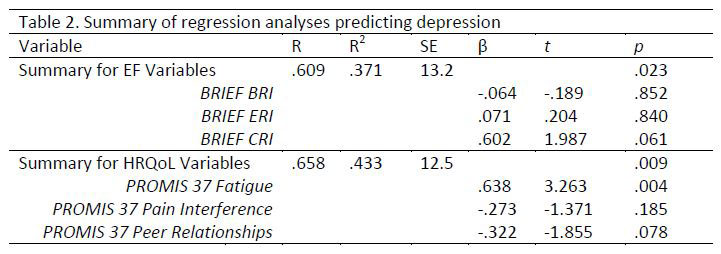Session Information
Date: Sunday, November 13, 2022
Title: Pediatric Rheumatology – Clinical Poster II: Connective Tissue Disease
Session Type: Poster Session C
Session Time: 1:00PM-3:00PM
Background/Purpose: Depression is a frequent symptom in childhood-onset SLE (cSLE), and is likely multifactorial. Executive function (EF) refers to conscious and volitional efforts to regulate emotion, cognition, and behaviour. Therefore, poor EF skills are likely related to poor psychological wellbeing. However, although EF is also frequently impaired in cSLE, no research has examined the relationship between EF and depression in cSLE. Similarly, despite evidence of a relationship between health-related quality of life (HRQoL) and depression, the relationship between individual facets of HRQoL (e.g., fatigue, pain interference, peer relationships) and depression is under-researched in cSLE. We examined the association between depression, EF and HRQoL in cSLE.
Methods: We examined a cross-sectional sample of youth ages 12-17 years from a pediatric SLE outpatient clinic at a major tertiary hospital between January 2020 and May 2022. Patients met ACR or SLICC classification criteria for SLE. Depression symptoms were measured using the Beck Depression Inventory or Children’s Depression Inventory. The self-report version of The Behavior Rating Inventory of Executive Function, Second Edition (BRIEF-2) was used to measure EF. Pearson correlation was used to determine whether there was a relationship between depression scores and total scores of the BRIEF-2 (Global Executive Composite, GEC). The three indices that make up the BRIEF-2 (Behavior Regulation Index, BRI; Cognitive Regulation Index, CRI; Emotion Regulation Index, ERI) were used for further analyses of EF. The fatigue, pain interference, and peer relationships domains of the Patient-Reported Outcomes Measurement Information System (PROMIS) Pediatric Profile 37 (PROMIS 37; a self-report measure) were used to measure HRQoL. Two separate multiple linear regression models tested the association between depression and i) the three BRIEF-2 indices, and ii) three PROMIS measures for HRQoL.
Results: Twenty-eight youth (mean age 15.8 ± SD 1.5 years, 86% female, 75% self-identified as non-white) were included in the analysis (Table 1). The mean ± SD depression score was 61.4 ± 15.5. The mean ± SD EF scores were 57.0 ± 12.3 for the GEC and 53.8 ± 11.3 for the BRI, 56.3 ± 11.3 for the ERI, and 58.0 ± 13.2 for the CRI indices of the BRIEF-2. The mean ± SD HRQoL scores were 50.8 ± 12.3 for the fatigue, 44.3 ± 10.8 for the pain interference, and 48.9 ± 12.3 for the peer relationships domains of the PROMIS 37. There was a significant correlation between depression and overall EF (GEC; r = .580, p = .003). The first multiple regression (Table 2) revealed that the three EF indices predicted 37.1% of the variance in depression and the model was significant, F(3, 20) = 3.930, p = .023. The second multiple regression (Table 2) revealed that the three facets of HRQoL (fatigue, pain interference, peer relationships) predicted 43.3% of the variance in depression and the model was significant, F(3, 20) = 5.093, p = .0009. Fatigue alone added statistically significantly to the prediction (p = .004).
Conclusion: On average, depression was high, and was associated with poorer EF and higher levels of fatigue. Future research should continue to examine the relationship between depression, fatigue and EF in cSLE.
To cite this abstract in AMA style:
Zapparoli B, Mossad S, Fevrier S, Lishak V, El Tal T, Ng L, Moaf P, Law J, Mohamed I, Hiraki L, Levy D, Danguecan a, Knight A. The Association of Depression with Executive Function Skills and Health-Related Quality of Life in Youth with Systemic Lupus Erythematosus [abstract]. Arthritis Rheumatol. 2022; 74 (suppl 9). https://acrabstracts.org/abstract/the-association-of-depression-with-executive-function-skills-and-health-related-quality-of-life-in-youth-with-systemic-lupus-erythematosus/. Accessed .« Back to ACR Convergence 2022
ACR Meeting Abstracts - https://acrabstracts.org/abstract/the-association-of-depression-with-executive-function-skills-and-health-related-quality-of-life-in-youth-with-systemic-lupus-erythematosus/


